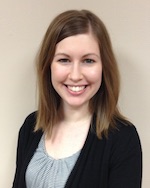Interview with Lauren Hays
 Lauren Hays is the Instructional and Research Librarian and the Co-Director of the Center for Games and Learning at MidAmerica Nazarene University. She holds an undergraduate degree in education, a masters in library science, a masters in educational technology, and a graduate certificate in online teaching and learning.
Lauren Hays is the Instructional and Research Librarian and the Co-Director of the Center for Games and Learning at MidAmerica Nazarene University. She holds an undergraduate degree in education, a masters in library science, a masters in educational technology, and a graduate certificate in online teaching and learning.
We previously interviewed Lauren about two classes she has been teaching for us for some time: Gaming in Libraries and Informal Learning in Academic Libraries. You can read that interview here. She has agreed to do another interview with us, this one about her new class, An Introduction to the Scholarship of Teaching and Learning.
Lauren, to start out, what is “the scholarship of teaching and learning?”
The Scholarship of Teaching and Learning (SoTL) is a movement in higher education to study teaching and learning in order to improve both. Findings are then shared publicly. Typically, SoTL research is conducted by professors in their own classes, but it can also take place at a broader institutional level. SoTL has experienced tremendous growth since it was first introduced by Ernest Boyer in his seminal work Scholarship Reconsidered: Priorities of the Professoriate (Boyer referred to it as the scholarship of teaching). Now, many institutions recognize and support SoTL as an area of research, scholarly activity, and professional development.
How is it different from prior education research and theory?
This is a question that comes up a lot when SoTL is discussed. Educational research and theory is typically conducted by trained educators. On the other hand, SoTL is often conducted by instructors who are trained in other areas (e.g. librarians, sociologists, biologists, etc.). The unique disciplinary perspectives these instructors bring to research on teaching and learning is beneficial because these disciplinarians understand the habits of mind necessary to learn and grow in the particular subject they are teaching. Additionally, each subject-expert brings unique research methods from their own discipline and can research teaching and learning in distinct ways.
Ah, that is very interesting. So, given that, could you describe the class that you have developed?
Yes, in An Introduction to the Scholarship of Teaching and Learning, we will read many of the prominent articles in the field and gain an understanding of the big picture of SoTL. Then we will transition to thinking locally about how we can use SoTL to improve our own teaching practice, perhaps conduct SoTL research, and support SoTL on our campuses. I hope course participants will come away with practical ideas for getting involved and using SoTL. Specifically, each person in the course will brainstorm at least one idea they have for a SoTL research project.
Also, SoTL emphasizes the teaching commons. Instead of teaching as an isolated act individuals who participate in SoTL share their teaching publicly in order to build support for teachers. This is another goal I have for this class. I want to bring people together who care about teaching and care about students’ learning, and then build a community of librarian SoTL scholars.
That seems like a really good goal, and I hope your class can help facilitate that. I can imagine it leading to other projects.
Since you’ve taught other classes with LJA previously, I wonder if you could tell us some reflections on that experience. What has it been like teaching your classes, and what have you learned from doing it that you plan to apply with this class?
Well, first, I always enjoy teaching. I am a teacher at heart and am always excited to journey alongside others in learning. Teaching professional development (PD) courses, however, was a bit of a challenge at first. Many of participants in the courses have an amazing depth and breadth of experience. Therefore–as is useful for good teaching generally, but even more so for PD courses–acting as a facilitator, supporter, and idea-generator is how I have learned to teach in this setting.
Thank you, sounds good. Before I let you go, is there anything else you’d like readers to know?
Thank you for the opportunity to share about this course. I look forward to teaching it!